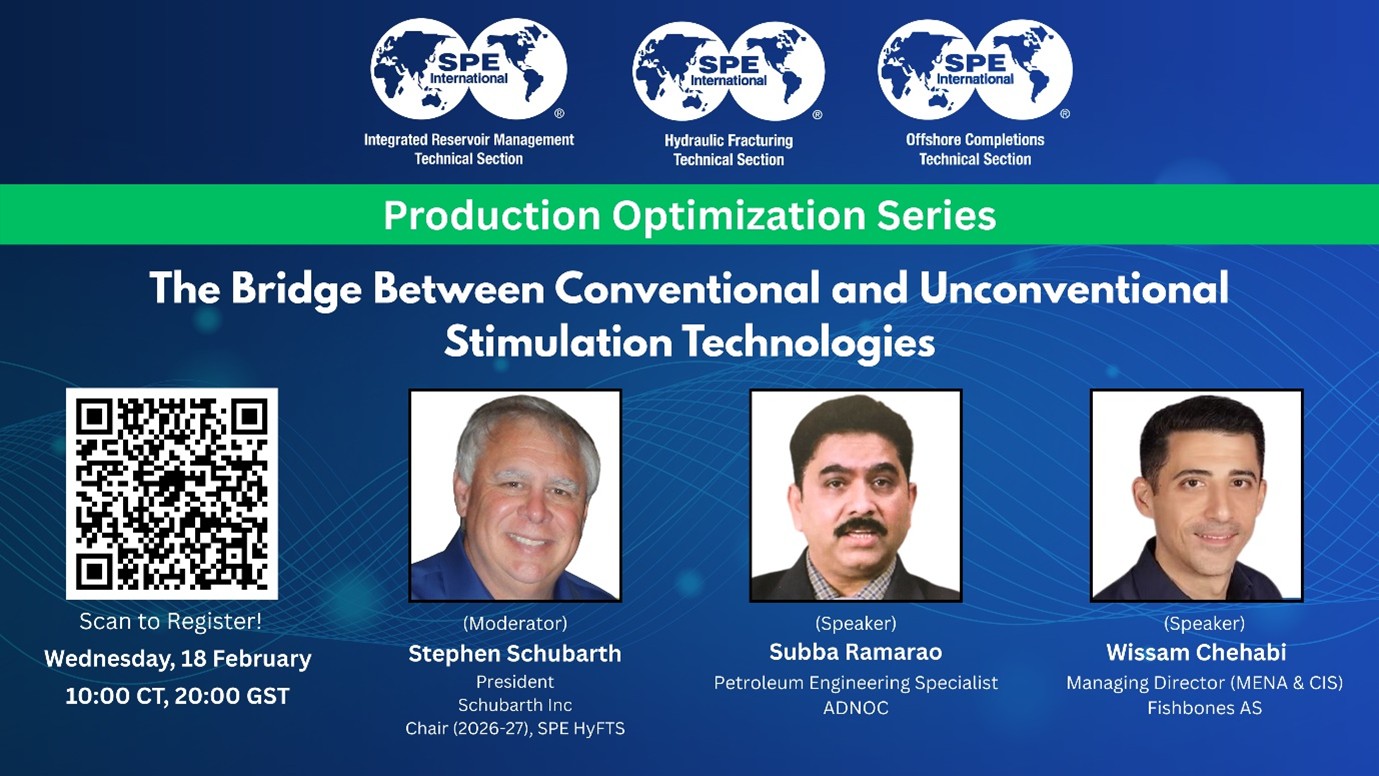
Joint Webinar Series Coming Up Wednesday, February 18
The SPE Integrated Reservoir Management (IRM) Technical Section, in collaboration with the SPE Hydraulic Fracturing (HyF) Technical Section and the SPE Offshore Completions (OC) Technical Section, invites you to a focused technical webinar on: 𝗧𝗵𝗲 𝗕𝗿𝗶𝗱𝗴𝗲 𝗕𝗲𝘁𝘄𝗲𝗲𝗻 𝗖𝗼𝗻𝘃𝗲𝗻𝘁𝗶𝗼𝗻𝗮𝗹 𝗮𝗻𝗱 𝗨𝗻𝗰𝗼𝗻𝘃𝗲𝗻𝘁𝗶𝗼𝗻𝗮𝗹 𝗦𝘁𝗶𝗺𝗶𝘂𝗹𝗮𝘁𝗶𝗼𝗻 𝗧𝗲𝗰𝗵𝗻𝗼𝗹𝗼𝗴𝗶𝗲𝘀.
As stimulation design moves beyond a binary choice between matrix acidizing and large-scale fracturing, engineers increasingly face a technical middle ground—particularly in tight carbonates—where effectiveness, execution risk, and economics must be balanced.
𝗬𝗼𝘂 𝘄𝗶𝗹𝗹 𝗴𝗮𝗶𝗻 𝗶𝗻𝘀𝗶𝗴𝗵𝘁𝘀 𝗼𝗻:
- Positioning advanced stimulation techniques including fishbone stimulation, Limited-Entry Liner (LEL) stimulation, abrasive jetting, and emulsified acid within an integrated stimulation decision framework
- Defining clear thresholds for when hydraulic fracturing is the preferred option
- Candidate selection, execution considerations, and diagnostics
- Interpreting production response and sustainability metrics for risk-aware decision-making
𝗠𝗼𝗱𝗲𝗿𝗮𝘁𝗼𝗿:
- Stephen Schubarth – President, Schubarth Inc.
Chair, SPE Hydraulic Fracturing Technical Section (2026–27)
𝗦𝗽𝗲𝗮𝗸𝗲𝗿𝘀:
- Subba Ramarao Rachapudi Venkata – Petroleum Engineering Specialist, ADNOC Onshore Technical Center
- Wissam Chehabi – Managing Director (MENA & CIS), Fishbones AS
𝗗𝗮𝘁𝗲: Wednesday, 18 February 2026
𝗧𝗶𝗺𝗲: 10:00 AM CT | 08:00 PM GST
𝗢𝗻𝗹𝗶𝗻𝗲 𝗭𝗼𝗼𝗺 𝗪𝗲𝗯𝗶𝗻𝗮𝗿 𝗥𝗲𝗴𝗶𝘀𝘁𝗿𝗮𝘁𝗶𝗼𝗻 𝗟𝗶𝗻𝗸: https://us06web.zoom.us/meeting/register/iVc6-Va_R2CuvU28X0gAyg